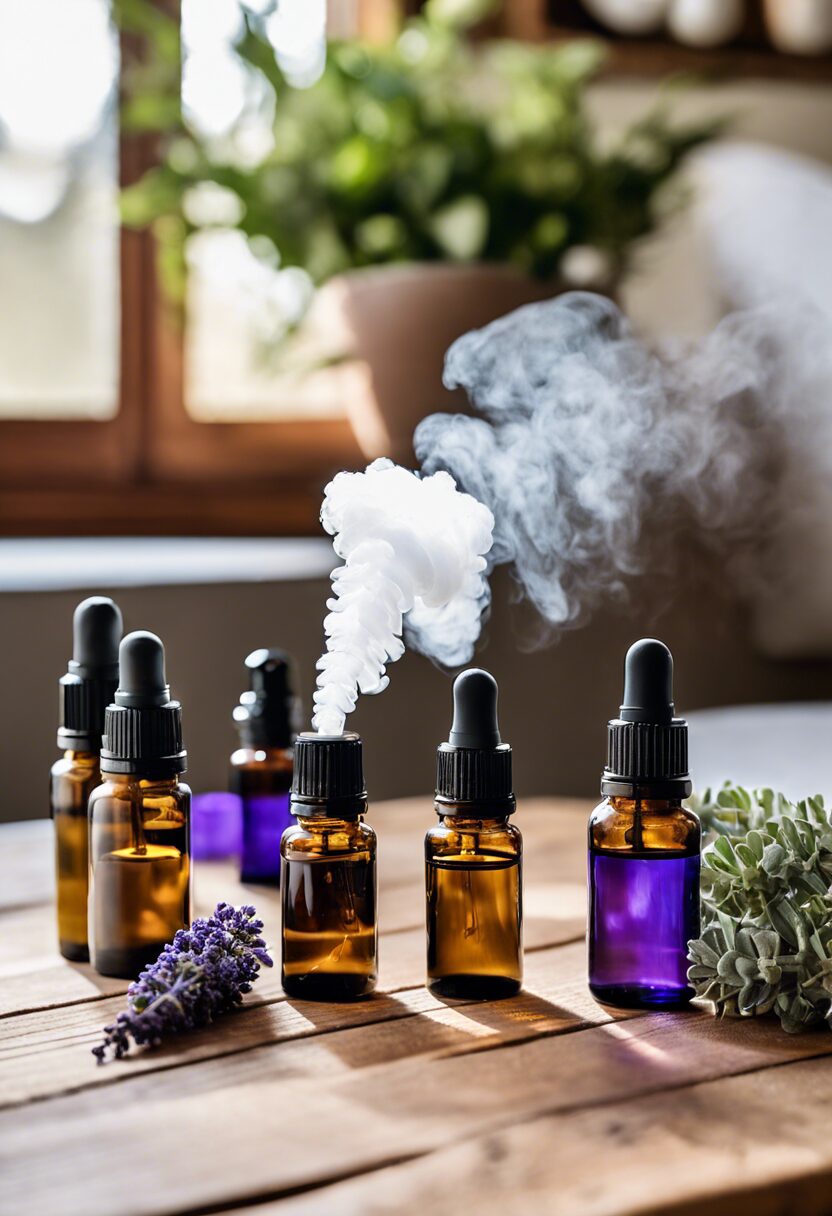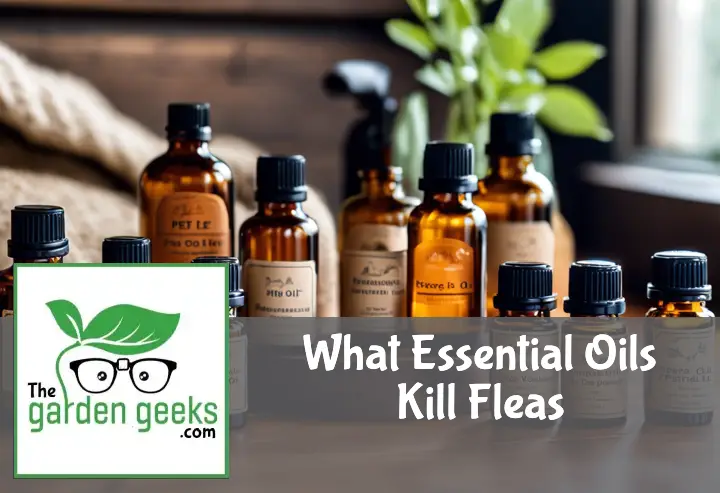Ever had to deal with pesky fleas at home? It’s like they’re playing hide and seek, but you’re always ‘it’, right? Well, let me tell you about the time I discovered a natural solution. You see, I was sipping my lavender tea when it hit me – Does Lavender Kill Fleas?
In this blog post, we’ll delve into the world of essential oils and their flea-fighting abilities. So, buckle up as we explore which essential oils have been given the ‘flea terminator’ badge and how to use them effectively. Keep reading about ‘What Essential Oils Kill Fleas?’
Key Takeaways
- Essential oils can be an effective, natural method for getting rid of fleas. But remember to use them correctly and safely to avoid harming your pets or yourself.
- Not all essential oils are safe for all pets, so always do your research before using them. Some of the most effective ones include peppermint oil, lavender oil, tea tree oil, lemongrass oil, basil oil, citronella oil, and cedarwood oil.
- These oils work by repelling fleas with their strong scents and some even have insecticidal properties that kill adult fleas and their larvae.
- Essential oils are not a standalone solution for flea infestations. Regular cleaning, vacuuming, and appropriate flea treatments for your pets are also necessary to completely eradicate these pests.
- Fleas dislike the smell of many essential oils but they’re primarily attracted to warm-blooded animals and their body heat rather than specific smells.
- While chemical treatments usually kill fleas the fastest, natural alternatives like cedarwood oil can also be very effective in controlling these pests.

Are Essential Oils an Effective Way To Get Rid of Fleas?
Essential oils have been gaining popularity as a natural flea repellent. They are not only effective in combating flea infestations but also offer a pet-safe flea treatment option. Let’s take a closer look at some of these effective essential oils against fleas.
| Essential Oil | Effectiveness (Repellent/Insecticidal) | Safety Notes (Safe for Pets/Use with Caution) |
|---|---|---|
| Lavender | Moderate repellent | Generally safe for dogs; use with caution in cats |
| Peppermint | High repellent; Low insecticidal | Use with caution in both dogs and cats |
| Eucalyptus | High repellent; Moderate insecticidal | Toxic to cats; use with caution in dogs |
| Cedarwood | High repellent; High insecticidal | Generally safe for both dogs and cats |
| Lemongrass | High repellent; Moderate insecticidal | Use with extreme caution in pets |
| Rosemary | Moderate repellent | Generally safe for dogs; not recommended for cats |
| Tea Tree (Melaleuca) | Low repellent; High insecticidal | Toxic to both dogs and cats; should not be used on pets |
| Neem | High repellent; High insecticidal | Generally safe for dogs when diluted properly |
| Citronella | High repellent | Use with caution around pets |
| Geranium | Moderate to high repellent | Safe for dogs in dilution; toxic to cats |
Note: Always consult a veterinarian before using essential oils around pets, especially if the pet is pregnant, nursing, or has a medical condition. Dilute oils properly and use them in well-ventilated areas.
Peppermint Oil
Peppermint oil is often touted as a powerful natural pest control solution. Its strong scent acts as a deterrent, making it an effective peppermint oil flea repellent. But remember, while it’s great for keeping those pesky fleas at bay, it should be used cautiously around pets and children.
You can create your own DIY spray with peppermint oil and water, providing a safe and natural way to protect your home. This method of using peppermint against fleas is not only effective but also leaves your home smelling minty fresh!
Lavender Oil
Next up on our list is lavender oil. This sweet-smelling essential oil does more than just provide aromatherapy benefits to humans. It’s also an excellent natural flea repellant bedding treatment.
Spraying diluted lavender oil on your furniture and bedding can help keep fleas away. Plus, the calming aroma of lavender can make bedtime even more relaxing for you! So next time you’re wondering ‘Does Lavender Kill Fleas?‘, remember that while it might not kill them outright, it sure does help repel them!
Tea Tree Oil
Tea tree oil has potent insecticidal properties that make it effective against fleas. However, this powerful essential oil comes with a word of caution – it can be toxic if ingested by pets.
Therefore, when using tea tree oil as part of your natural flea treatments, always ensure it’s out of reach from curious paws and noses! Despite its potential toxic effects, when used responsibly, tea tree oil can be a valuable tool in your flea prevention arsenal.
Lemongrass Oil
Lemongrass oil is another citrus essential oil that’s effective against pests. Its citrusy aroma and insecticidal properties make it a potent weapon in disrupting the flea lifecycle.
A few drops of lemongrass oil in your regular cleaning routine can help repel fleas and keep your home smelling fresh. Just remember to use it sparingly around pets, as some may find the strong scent overwhelming.
Basil Oil
Basil isn’t just for cooking! The strong aroma of basil oil makes it an effective pest deterrent. Fleas aren’t fans of this herbaceous scent, making it an excellent choice for natural aromatherapy against insects.
You can use basil essence around your home for protection against fleas while also enjoying its uplifting fragrance. It’s a win-win situation!
Citronella Oil
Citronella is well-known for its insect-repelling properties, especially against mosquitoes. But did you know it’s also effective against fleas? Using citronella in diffusers or sprays can help keep these pesky pests at bay.
Whether you’re using citronella for indoor or outdoor pest control, this essential oil offers a natural and pleasant-smelling solution to your flea problem.
Cedarwood Oil
Last but not least, cedarwood oil offers unique benefits in the fight against fleas. Not only does it repel these pests with its distinct woody scent, but it also disrupts their life cycle.
By adding a few drops of cedarwood oil to pet bedding or using it in DIY sprays around the house, you can prevent flea eggs from hatching. This holistic approach to pest control helps keep your home flea-free naturally!
Get Rid of Fleas for Good
Now, let’s get down to the nitty-gritty. Essential oils are great and all, but they’re not the be-all and end-all solution for those pesky fleas. You’ve got to combine them with other flea eradication methods if you want to say bye-bye to these bloodsuckers for good.
First off, we’ve got regular cleaning. I’m talking about a deep clean here, folks. Scrub every nook and cranny, wash all your linens, and don’t forget about your pet’s bedding too! This is a crucial part of home cleaning for flea removal.
Next up is vacuuming. Now this might sound like a chore (and it kinda is), but trust me when I say it’s worth it. Vacuuming can suck up flea eggs and larvae hiding in your carpets or upholstery. So make sure you’re vacuuming for fleas regularly.
And let’s not forget about treating our furry friends! There are loads of pet flea treatment options out there – from spot-on treatments to oral tablets. Just remember to consult with your vet first before starting any new treatments.
When it comes to natural vs chemical flea treatments, there’s no one-size-fits-all answer. Some folks swear by natural methods like essential oils (did someone ask “Does Lavender Kill Fleas“?), while others prefer more traditional chemical treatments.
The key here is an integrated pest management for fleas, combining different strategies for effective flea control. And remember, maintaining a flea-free environment isn’t just a one-time thing – it requires consistent effort!
So there you have it – some comprehensive flea prevention strategies that go beyond just using essential oils. Remember, when dealing with fleas, it’s always better to fight on multiple fronts!



FAQs


We’re diving into the nitty-gritty of essential oils for fleas. We’ll be sniffing out the truth about flea-repelling scents, whipping up a batch of homemade flea spray, and busting some myths about what really attracts these pesky pests.
What smell do fleas hate the most?
Fleas are not fans of strong, pungent odors. They particularly dislike the scent of peppermint oil and lavender oil. These oils act as natural flea deterrents because their potent aroma overwhelms the tiny critters’ senses.
So, if you’re wondering ‘Does Lavender Kill Fleas?‘, well it doesn’t exactly kill them but it sure does repel them! Using these oils around your pets can create a protective barrier against fleas.
What essential oils are in homemade flea spray?
When crafting your own DIY flea spray, there’s a variety of safe essential oils for pets to choose from. Oils like lavender, peppermint, and cedarwood are popular choices due to their potent pest-repelling properties.
Remember though, when making your own homemade pest control, always dilute the essential oils with water or a carrier oil to ensure they’re safe for your furry friends!
What kills fleas the fastest?
While chemical treatments may offer quick flea eradication, they often come with unwanted side effects. On the other hand, natural remedies like cedarwood oil may take slightly longer but are safer for both pets and humans.
The effectiveness of cedarwood oil lies in its ability to dehydrate and suffocate fleas. So while it might not be as fast-acting as chemicals, it’s definitely worth considering!
What smells attract fleas?
Contrary to popular belief, fleas aren’t attracted to specific smells. Instead, they’re drawn to warmth and body heat. This means that keeping your pets clean won’t necessarily prevent flea infestations.
The best way to protect your pets is by minimizing their exposure to environments where fleas are likely to thrive, such as dirty bedding or outdoor areas with tall grass. Understanding flea behavior can go a long way in preventing an infestation!


To Wrap Up
So, we’ve been on a bit of a flea-killing safari today, haven’t we? From the citrusy zing of lemongrass to the soothing scents of lavender and peppermint, essential oils are like the superheroes of the insect world. They swoop in and save the day from these pesky critters.
But remember, not all heroes wear capes. Sometimes they come in small bottles with droppers. So if you’re still wondering ‘Does Lavender Kill Fleas‘, or which essential oil should be your weapon of choice against fleas, don’t hesitate to dive back into our blog for more insights!


